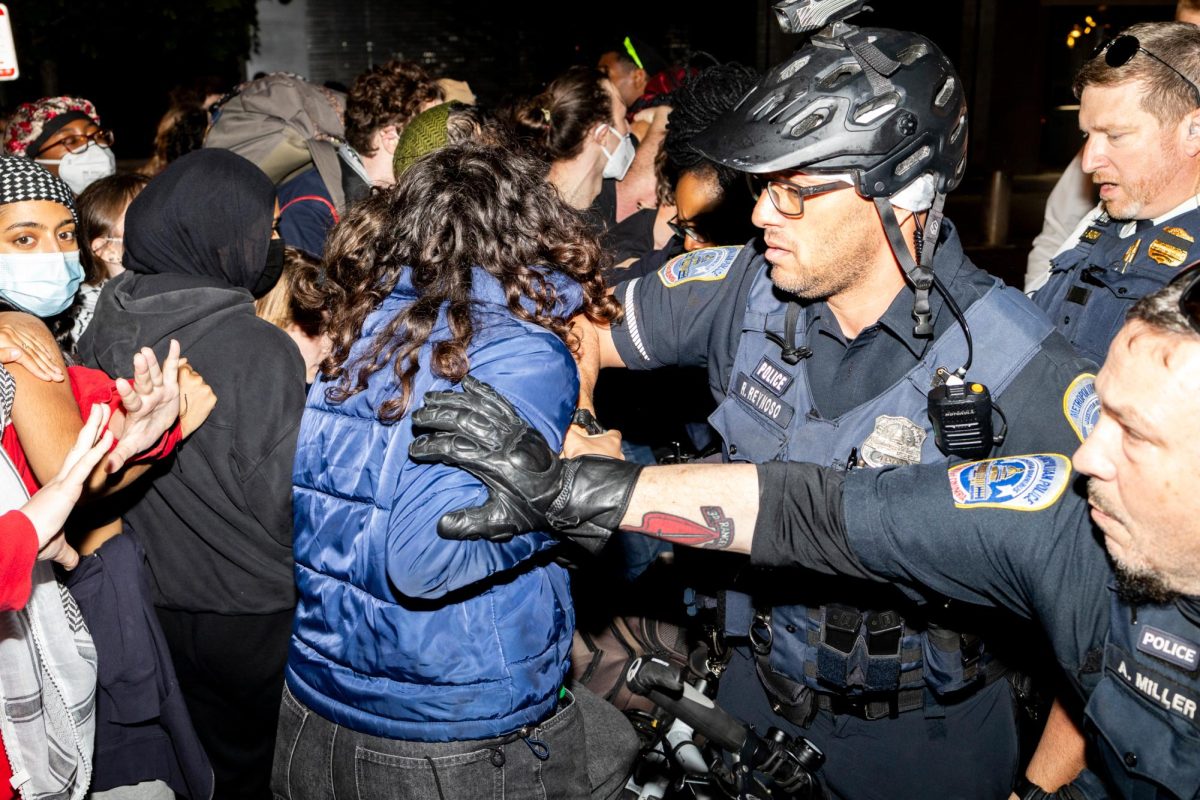The University will propose changes for the Mount Vernon Campus to the Board of Trustees later this month, including a switch to co-educational living in some of the campus’s residence halls and a greater presence of the University Honors Program.
I think from a programming standpoint and given the interests of students and the change in education trends, to offer really both options is best for students and best for the University, said MVC Executive Dean Grae Baxter, who emphasized that the plans are tentative. The women’s leadership and single-gender housing options can benefit from having on-campus the co-educational housing options. It’s a synergistic programming proposal.
Baxter said the proposal, which will be finalized before the Oct. 20 meeting of the Board of Trustees, will reflect feedback from alumnae of the historically all-women campus.
Should the campus switch to a co-educational format, Baxter said the campus would retain single-sex housing for female students.
Construction is underway to expand on-campus living and athletic facilities at Mount Vernon. An addition to Somers Hall will add 183 more beds, increasing the number of students living at Mount Vernon to 440 residents. New tennis courts and athletic fields for soccer and lacrosse are also under construction.
The reason students will want to live here is because of the wonderful sense of community and quality of community life, Baxter said.
Dean of Students Linda Donnels said Student Academic and Support Services would accept Mount Vernon administrators’ plans for the campus.
Donnels said the University would most likely maintain beds for Mount Vernon students who want to stay at the campus.
The University probably will not make any decisions concerning the future of the campus until after Jan. 1, when the housing lottery is closer, Donnels said.
This is not the first time the University has proposed housing men at Mount Vernon.
In February 1999, the University attempted to switch Pelham Hall into an all-male residence hall.
Robert Chernak, vice president for SASS, said the proposal arose because enrollment projections for the campus indicated 80 to 100 beds would remain unoccupied, according to a Feb. 1, 1999 issue of The Hatchet. As a result, the University proposed making up the difference by housing 88 men at MVC.
One week after the announcement, female residents petitioned GW President Stephen Joel Trachtenberg to make the building co-educational instead of all-male because they said they were misled into believing the campus would remain an all-female campus.
I’m persuaded by your argument and will ask . to bring about the outcome that you seek, Trachtenberg wrote to Mount Vernon residents on Feb. 8, indicating that Pelham would remain an option to women.
Since that time, the campus has maintained all-female residence halls, although it has hosted co-ed classes for the past two years.
We are sustaining the best of the all-women’s tradition here, Baxter said. The best of both worlds on a single campus.
The female-orientated programs, such as the Women and Power program will remain on the campus, Baxter said.
In order to create a larger upperclassman presence at the predominately-female campus, GW may integrate the University Honors Program with Mount Vernon.
David Alan Grier, director of the Honors Program, said program directors are considering expanding to the campus to take advantage of its facilities.
The campus would allow a more concentrated and successful location for the Honors symposium, a weekend-long panel discussion once every semester, he said.
We’re basically shoe-horned in at the last minute, said Grier, referring to the last-minute arrangement for classroom space for the symposium because it is not considered an academic class.
Maintaining a branch of the Honors Program at Mount Vernon would create a balanced program and offer a location for intellectual retreats, Grier said.
Grier said the Honors Program would maintain its central Foggy Bottom location and still offer housing in Lafayette Hall for freshmen, but would expand its program options to Mount Vernon.
The planning has been on-going for at least eight or nine months, but the real focus has come over the last two and one-half months, Grier said.
The expansion will allow the Honors Program to increase its enrollment to the proportion of all incoming students it held in 1994, Grier said. Since that time, the program has admitted a flat number of 120 incoming students while total GW student enrollment has continually increased, Grier said.
We’re working hard under a tight timeline, Grier said about the 11-year-old program. We have developed things that have worked and we’ve tried things . the fact that we don’t have all the details shouldn’t bother anybody.
Some Mount Vernon residents said they want men on their campus.
Going co-ed would be the best of both worlds, said freshman resident Emily Gabriel, who said she chose to live at Mount Vernon for the Women and Power program.
Going co-ed is a good idea because living there makes it hard to meet guys, said sophomore Laura Milner, who transferred to GW. Things change and it’s time for Mount Vernon to move on. But the only guys who will live there are incoming freshmen because guys on Foggy Bottom . still think of it as a women’s campus.
Others said the proposed changes undermine the University’s original promise to keep Mount Vernon’s as a traditional all-female campus.
A former resident of the campus, Diedre Ehlen, echoed sentiments of some Mount vernon alumnae.
I feel like GW took advantage of Mount Vernon because of its historical value as a women’s campus, Ehlen said. All these changes and construction are typical of GW and ignore what Mount Vernon is all about.
Ehlen said Mount Vernon will preserve its appealing qualities whether or not men live there.
Mount Vernon has a safe and homey feeling, Ehlen said. People that don’t want the hustle and bustle of living in a city, but want a city school, will want to live there, whether they’re guys or girls.
Mike Melen, who recently applied to the Honors Program, said he thought co-ed living was a good addition to MVC, but he would not want to live at the campus.
A co-ed campus is a good addition to Mount Vernon, Melen said. But everyone will say going co-ed is a good idea as long as they don’t have to live there themselves.
Grier said Mount Vernon may be attractive to students who come to GW for city life and decide that a city campus is not for them.
Baxter said other programming options are under consideration, including an expansion of the campus’s interior design program.
We have a very strong interior design program that is thriving, and we want very much to continue a very strong arts presence both for student organizations and theater and dance, Baxter said.
Currently, more students from the Foggy Bottom campus than Mount Vernon take classes at MVC, Baxter said.
The Mount Vernon Campus has a tradition of change and embracing change, Baxter said. This is another way this campus can be responsive in the change of educational trends.







